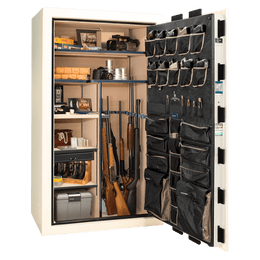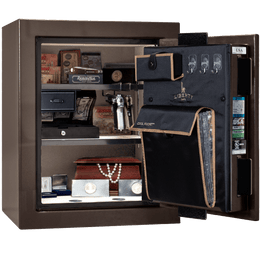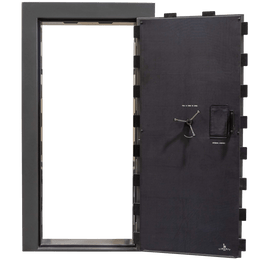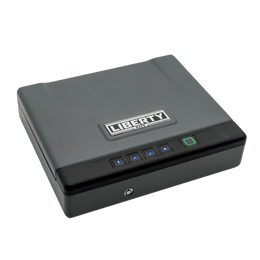You can never be too safe when it comes to protecting your home, family, and possessions from burglars and home invaders. There is no need to risk your safety with all the home security systems and products that are now out on the market. At Liberty Safe, we care about you and your family’s safety. You might only know us because of our high-quality gun and home security safes. However, we would also like to provide you with everything you need to know about home security systems to keep you, your family, your home, and your valuables safe from intruders.
Table of Contents
- What Are Home Security Systems?
- Should I Get a Home Security System?
- What Security System Is Best for Your Home?
- What Features Should I Include in My Home Security System?
- Home Security Alarm Panel
- Home Security Cameras
- What Are Door and Window Sensors?
- Environmental Sensors to Keep Your Family Safe
- Top 8 Tips for Improving Home Security to Keep Your Family Safe
What Are Home Security Systems?
In years past, your only option for home security systems were high-priced professional wired systems— systems that required professional installs, high startup costs, and expensive, long-term contracts. If you didn't want to pay for all of that, your only alternative was depending on your home’s door and window locks, and maybe a "beware of dog" sign.
Now, though, there's a plethora of systems, products, and options to choose from for home security, all designed to alert you if someone is lurking around your home or trying to break in.
In the United States, a burglary is committed every 13 seconds, and it's not just the very wealthy that have their homes burglarized. Burglaries happen to people at every income level. But with wide variety of home security systems and products available, there are affordable options for almost anyone that wants at least some type of added security for their home. Increasing the security of your home will also increase your peace of mind that your family and home are protected from burglars.
Should I Get a Home Security System?
You might be asking yourself whether you really need a home security system. If you are a gun owner, you might think having fast access to your firearm is all you need to protect your family and home. But what if you are not home or you are sleeping and suddenly awakened by a burglar in your home? You cannot always be ready, but the right security system can alert you to dangers, whether you are home or not. It can also alert you to incidents in your home, such as elderly family members needing assistance, kids coming home from school, or teenagers trying to sneak out in the middle of the night.
A recent survey estimated that only 38 percent of Americans have a home security product or system in their home. The main reason for purchasing security systems or products was because these people wanted to add security to their homes. So, let’s consider some more reasons why you might want a home security system:
- You live in a state with a high ranking on the list of burglaries per capita
- You live in an area that has experienced a high number of home invasions
- You want to keep an eye on your children and teens when they come home from school or you're away for the weekend
- You want to supervise pets, babysitters, house sitters, or anyone (or anything) else that comes into the home
- You have an increased risk for environmental dangers like smoke, fire, flooding, or carbon monoxide exposure
Home security systems can ease a number of insecurities, both when you're at home, and when you're away. Simply put, it's protection worth paying for.
What Security System Is Best for Your Home?
Once you've decided that it's time to protect your home with a security system, you are going to need to determine what type of system best suits your home and your family. There is a wide variety of home security products and systems available from an almost as wide range of manufacturers. All these products and systems generally fall into one of three categories:
- Traditional Security Systems – These are provided from companies such as ADT or Brinks that have professional monitoring and must be professionally installed. These systems tend to be more expensive than others, both in start-up and month-to-month costs. You're also limited to the company’s proprietary products, and locked into a contract that can be difficult to break if you need to move or can no longer afford it.
- DIY Systems – This is a system you assemble yourself. You buy the products, you install them, you get them to connect and interface, and you monitor the system. If you want to save money, a DIY system may be the way to go; however, you'll need to do your homework, and you may go through some trial and error finding the right components and getting them to work with each other.
- Hybrid Systems – This could be your best option if you want the best of both worlds. If you want the ability to pick and choose the components to build your home security system, have components that work well together without the guesswork, and have the option for professional monitoring without a long-term commitment, a hybrid home security system like Cove, Nest, or Blink may be a better choice for your family.
What Features Should I Include in My Home Security System?
The features you want in your home security system may differ from that of your neighbors. For most types of systems, the most common features fall into five categories.
Professional Monitoring Services
A traditional security system, like one from ADT or Brinks, will have professional monitoring. You will need to sign a contract and pay a monthly monitoring fee. A hybrid system, like Cove, Nest, or Blink, can also have professional monitoring, but you are not locked into a contract and can pay a month-to-month monitoring fee.
The advantage of having professional monitoring services is that you get 24/7 monitoring through a staffed central monitoring station, provided you have armed your system. If your security system is triggered, the central station will notify the proper authorities to respond to your home. A DIY system will usually limit you to self-monitoring with an app that may send you notifications.
Home Security Alarm Panel
The alarm panel is the brain of a home security system. This is where you will arm and disarm your home security system. Ideally, the alarm panel will be located near where you usually enter your home, giving you plenty of time to disarm the system when you enter. All the components of your home security system are generally controlled through the alarm panel, and it's where you can see the status of all your security components.
What Is the Best Home Security Camera?
Security cameras are the most popular components of a home security system. Depending on what your security needs are, these cameras can be placed inside or outside your home. You may want a camera near the various entrances to your home, in a baby’s nursery, or positioned to keep an eye on your pets while you are away from home.
Cameras can be wired to a control panel or a standalone home security camera system that they receive power from, or they can be wireless, battery-powered, and work over your home’s Wi-Fi connection. There are also cameras that have features like motion detection, microphones, integrated security lighting and so forth.
When choosing the best home security camera to fit your needs, look for such features as:
- 1080p resolution or higher
- Motion detection
- Audio detection
- Capabilities for storage and transmission of footage
- Night vision capability
- Ability to pan or zoom
- Wide-viewing angle
What Are Door and Window Sensors?
Sensors that alert you when a door or window has been opened are another very popular feature of home security systems. Many burglars simply walk or climb into homes through unlocked doors or open windows. With an armed monitored system, if a window or door is opened the alarm trips, notifying either you or the monitoring station (depending on your system) of a possible break-in. For these sensors to be effective, though you'll want to put a sensor on each door and window in your home.
Because there is always the risk that a burglar might simply break a window or the glass on an entry door to get in your home, having glass or window break sensors are also a smart idea, too. Break sensors can detect the sound of breaking glass and trigger your alarm system in response. The advantage of having break sensors is that if you have multiple windows in a room, you only need a single sensor to monitor them.
Environmental Sensors
Some dangers that threaten your family and your home aren't stopped by doors and walls. That's why it's important for homes to have environmental sensors. But while it's true that most homes have smoke detectors (and, less commonly, carbon monoxide detectors), unless they're designed to work over wifi, they can only alert you to problems if you're in the home. Likewise, if you live in a colder region, a flood-prone area, travel often, or if your home is empty during work hours, having flood sensors is a smart idea. These sensors can detect wetness or changes in the humidity of your home that suggest that you might have a water leak or flooding occurring.
Top 8 Tips for Improving Home Security to Keep Your Family Safe
Having a home security system can play a big part in helping keep your family and your home safe from criminals. But it is only one part of the safety equation, consider these additional tips to protecting your home and family:
- Keep a light on at night outdoors or invest in a motion-detecting light
- Keep your doors and windows locked, whether you are home or away
- Make it look like someone is at home while you are away by leaving the television or radio on and having lights set to go on and off at different times with a timer
- Get a dog and post “Beware of Dog” signs
- Build a good relationship with your neighbors and watch out for each other’s homes
To learn more about what you can do to protect your family and your home, click here.







